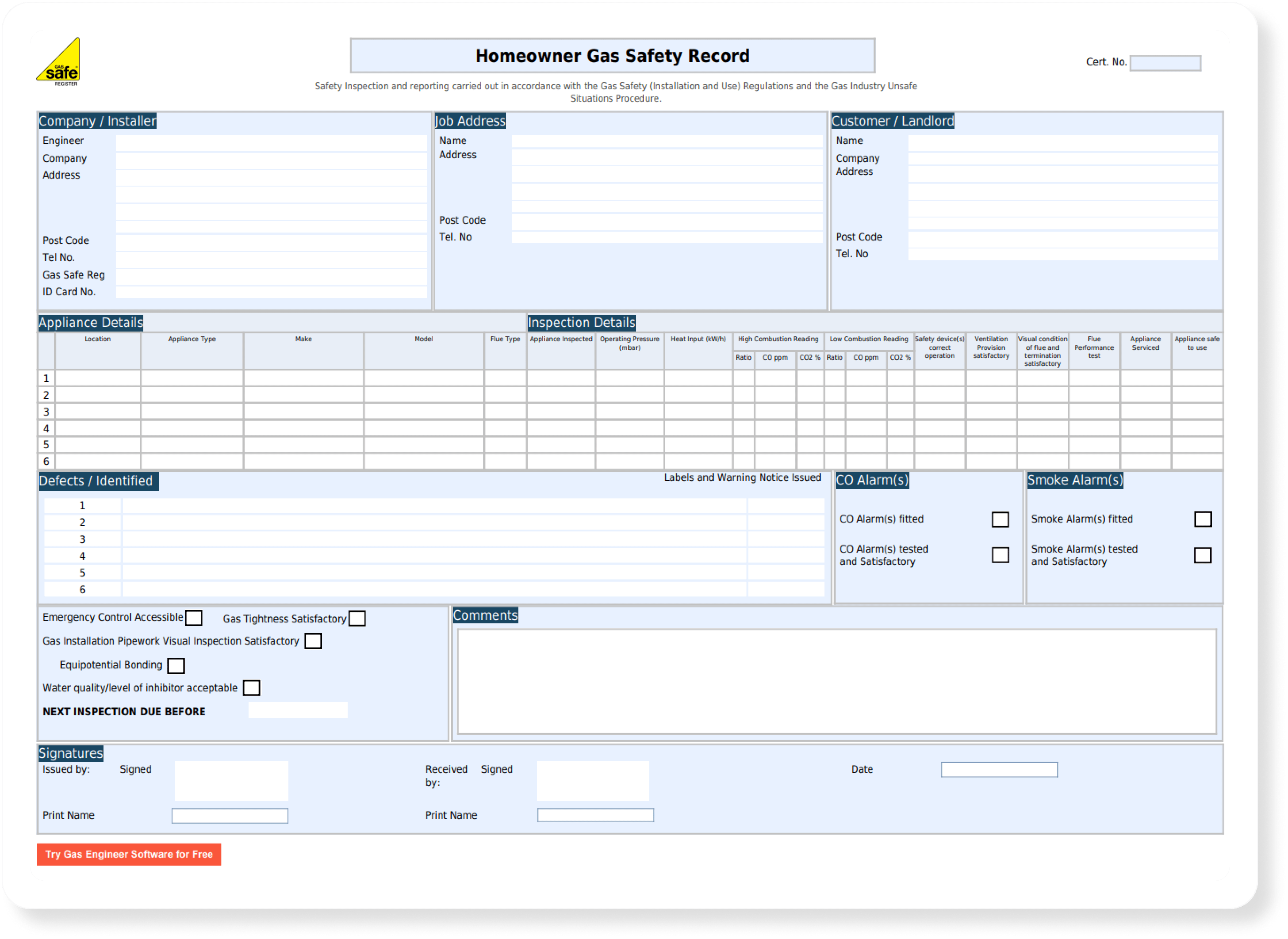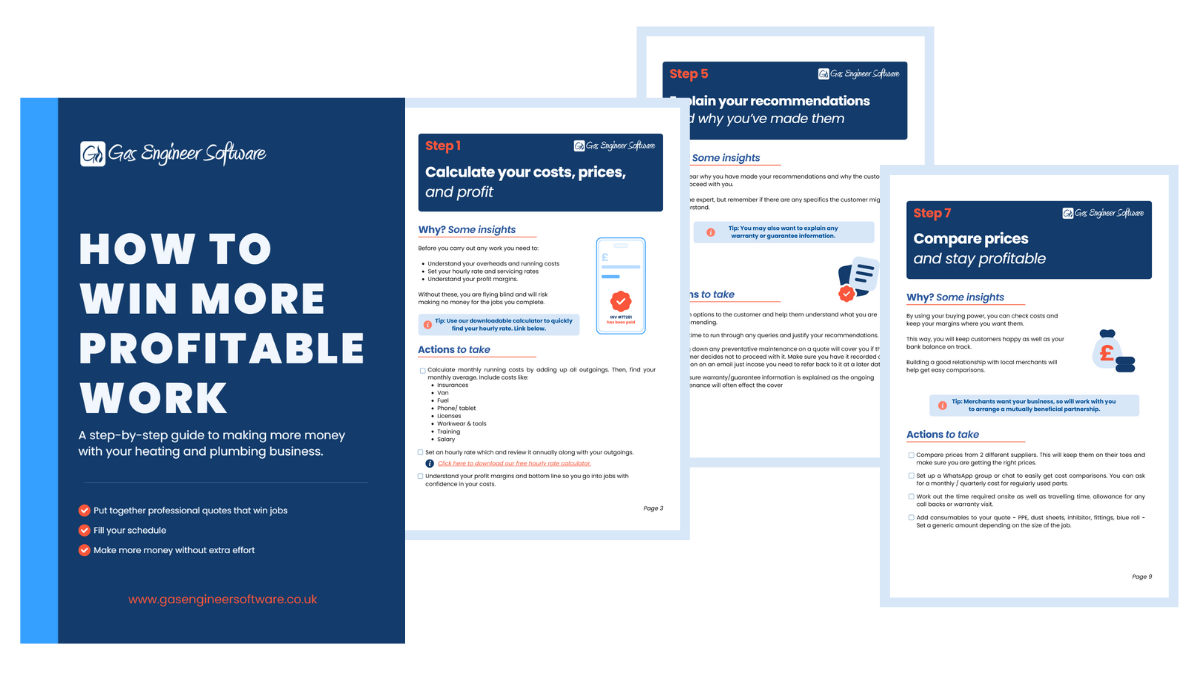How To Work Out Your Hourly Rate for Heating & Plumbing Jobs
![[Featured Image] Pricing guide (1)](https://gasengineersoftware.co.uk/wp-content/uploads/2024/06/Featured-Image-Pricing-guide-1.png)
Free Pricing Calculator
Add up all your costs & get an hourly rate.
By downloading this template you consent to receiving marketing emails from Gas Engineer Software.
Rushing from job to job but not making as much as you’d like? Calendar overflowing with work but no spare income to hire some help? Feeling unmotivated to do your best work?
These are just a few of the signs that you’re not charging enough.
Pricing can be deceptively simple. Nothing will stop you from pulling a number out of thin air, but a well-thought-out pricing strategy is core to the success of your business.
In this article, we’re going to cover the basics of calculating an hourly rate as a self-employed gas engineer. We’ve gathered a bunch of advice and tips from our podcast with Dan Voice, who’s had over 20 years of experience running Prime Fusion, and created a step-by-step guide to help you work out the perfect self-employed gas engineer hourly rate.
We’ll cover:
How to work out & use your hourly rate
Step #1: Work out & add all your costs
The first step to working out your gas engineer hourly rate is to make sure you understand your costs. Like many other trades, heating & plumbing businesses have a fair few to cover including but not limited to:
- Fuel, MOTs, and other van costs
- Insurance
- Tools
- Software (such as Gas Engineer Software)
- Salaries
- Marketing
- Utilities
You should also think about your preempted costs. This could be a new van, a replacement set of tools, or training courses.
Key business numbers also play a role in this. You’ll need to know (and regularly keep an eye on) your profit so that you can factor in business tax and VAT as an expense.
Chase late payers, keep your accounts in order, and handle all your paperwork with Gas Engineer Software.
(Fast & easy setup. No card details required.)
Step #2: Count your billable hours
Most of these costs are thought of as a yearly or monthly cost – but you shouldn’t simply divide them by 365 or 30 to get a daily rate.
“I start with all my costs and then divide them up by 200 – or the number of working days in the year. There’s no sense in costing your business over 365 days…It fundamentally won’t work – not unless you work 365 days,” explains Dan.
To find out the number of working days in the year, simply add up all the days you won’t be working and subtract that from 365. It could look like this:
365 – 102 (no. of Saturday and Sunday’s in a year) – 9 (no. of bank holidays) – 25 (holiday days) – 4 (guesstimated sick days) = 225.
It doesn’t stop there, though. You should also factor in how much of your time is spent on admin/paperwork/driving. You can think of this as a percentage to make things easier.
For example, 225 working days equates to about 1800 hours on the clock – but only 80% of them are billable – which would mean about 1440 hours.
“There’s no sense in costing your business over 365 days… It fundamentally won’t work.”
Step #3: Decide how much money you need & want (adding your markup)

Adding your rent, bills, food, and other essential living expenses to your business costs gives you your survival rate – the bare minimum you need to stay afloat.
From here, you need to decide how much you want to make. You could base this on how much you want to put into savings and keep as disposable income, or you could take go for a ballpark figure — Just make sure it’s more than what you’d get as an employee as there’s a fair bit more involved in running a business that you should get rewarded for.
Step #4: Use all of this information to decide on some reasonable prices
With your properly-costed hourly rate in mind, you can see how much you need to be charging. Remember to account for behind-the-scenes work for smaller jobs with fewer ‘billable hours’.
The calculation should look something like this:
Total expenses + desired income ÷ billable hours.
You might then start to compare your prices to your competitors. This is one of the biggest pricing traps for tradespeople and you should always stick to your worth – within reason, of course:
“If you need to be charging x amount of pounds and it’s way above the national average or even the local average, then you’ve got to do two things: look at your overheads, and look at your wage expectations – and tidy them up. But don’t be the cheapest fool in the village!” says Dan.
Using your hourly rate to price jobs
Hourly rates are a great way for self-employed gas engineers to price their work. All you need to do is estimate how long the job will take and multiply that by your hourly rate. This method allows for reliable pricing that is transparent for your customers and profitable for you.
But what if you were in and out of a property in 15 minutes? And, on the flipside, how do you estimate how many hours a larger project will take? We’ve written an in-depth article about how to quote a heating & plumbing job here.
And, if you prefer cost-plus, competition-based, or another pricing strategy, an hourly rate is still useful as it indicates a job’s profitability. You’ll be able to add it to invoices without raising any concerns from your customers.
Working with effective job management software designed for the heating & plumbing industry will also help you save hours each week and cut down your costs.
Why is it important to stick to your prices?
A properly costed and priced business is the most reliable road to success. Lowering prices to get more work may be tempting, but it will make your life much harder in the long run. “If you don’t know your own worth…you set yourself up for failure from day 1,” says Dan.
Besides, you don’t always lose a job because of prices and lowering them isn’t always the way to get more work. “For all you know, you might not have been getting that job from day one,” Dan jokes.
At the end of the day, if you’re making no money on a job, you’ll always be in a rush: “Charge slightly more, trust your services, and trust your worth.” Everyone makes mistakes and, if there’s no money in a job, there’s little incentive to go back and fix it.
Cheap jobs don’t mean happy customers
Learn more about why you should avoid underpricing & what average prices for heating jobs are in the UK here.
If you charge enough to do your best work, you’ll have happy customers that keep coming back. For example, Dan does about 90% of his work is done for existing customers – which is a much more lucrative and less stressful way to run your business. Learn more about that here.
“If someone’s after a cheap job, then they’re not for you.” he says. There’s also plenty of tried-and-tested marketing tactics you can use to get good customers.
“The reason why cheap jobs go wrong and you feel like you aren’t getting anywhere is because you are not earning enough money. You’re rushing stuff, you’re stressed, and you’re not gonna get return customers. Cheap will fundamentally cost you in the long run.” Undervaluing your work can lead you down a vicious cycle that can be hard to get out of, but the good news is that it’s easily avoided.
Should friends & family get special prices?
A lot of business owners struggle to say no to friends and family asking for special prices. Turning the question around makes it much easier: “A friend who will pay a complete stranger a full price but won’t pay their friend a full price for helping them out and doing a lovely job? I think bad friend, personally.”
There may be certain situations where you want to help out a friend or family member in need. But under normal circumstances, why wouldn’t your friend or family want to support your business?
“You could say to them, look, you buy the boiler. I think that’s as far as you should be going,” Dan adds.
Finding the perfect pricing balance
Pricing all comes down to one thing: making money. “Don’t be scared of making money. You’ve got to make loads of money…because that’s how business works.”
Your job is to simply find the balance between living comfortably, charging a fair price, and giving yourself enough time to do a good job. “You can’t do those things when you’re taking chickenfeed,” says Dan.
“If it’s costing you that much to live that reasonable lifestyle, it’s probably costing your competition that as well,” he adds. “Why devalue a trade just to get the one-upmanship to try and win that customer. You should win on being an absolute awesome engineer.”
Find out why Dan and more than 6000 other heating & plumbing businesses use Gas Engineer Software to manage jobs.
Get paid fast with Gas Engineer Software

Late payers are a consistent problem in the trades. Not only do you get an unpredictable cash flow, but you’ve got to spend hours working out who hasn’t paid and then chasing them up.
Gas Engineer Software can handle this whole process for you. Our integration with Crezco means your customers can pay you instantly without hefty fees using a convenient QR code or link.
For the remaining late payers, our software sends them an automated payment reminder nudging them along.
Next steps:
If you’ve been thinking about implementing software into your workflow to save time, here’s what you can do next:
- Visit our resources centre where you'll find more articles like this one and our free gas rate calculator.
- Start a free trial to see exactly how our software works for your business.
- Watch our video demo to get an idea of how our software works. You can also book a 1-on-1 session with our customer success team for a more personalised experience.
- Know an engineer who's still using paper? Help them and us out by sending our software their way!

